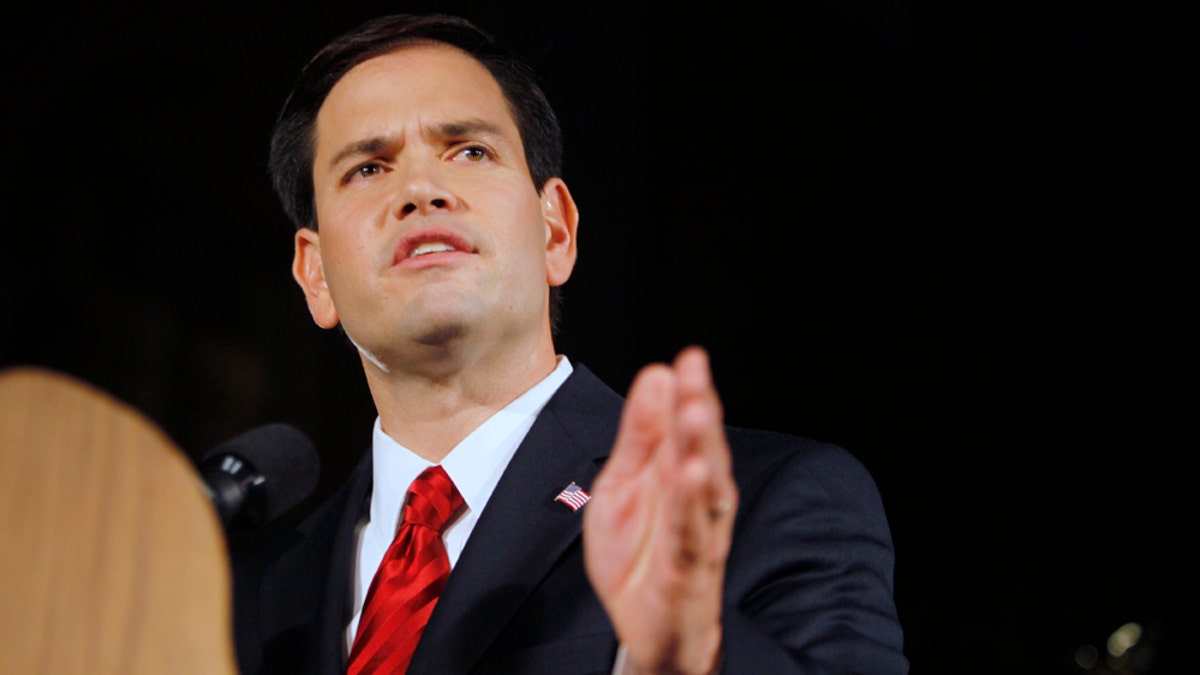
Sen. Marco Rubio (AP)
In an op-ed piece that appeared in Politico, Sen. Marco Rubio, who sits on the Senate Foreign Relations Committee, said that Russia's military intervention in Ukraine calls for no less than "immediate and decisive U.S. leadership."
Rubio said that the conflict can escalate, with broader repercussions in the region, and that the United States must act swiftly and condemn Russia's actions.
“Russia's illegal military incursion in the Crimea region in Ukraine is a grave violation of a nation's sovereignty and cannot go unpunished," Rubio said in the Politico piece. "First, President Obama should speak unequivocally and call this what it is: a military invasion. Second, President Obama should dispatch Secretary Kerry and Secretary Hagel to Kiev to show U.S. support for Ukraine's transitional government. Third, the U.S. should rally our allies to boycott this June's G8 summit in Sochi."
Rubio, a Florida Republican who frequently has accused the Obama administration of being too slow to react to international crises, said Russia needs to be handed consequences if it does not retreat.
"Any and all discussions and negotiations with Moscow on any issue unrelated to this crisis, including trade and other matters, should be immediately suspended," he said. "This is a critical moment in world history. The credibility of the alliances and security assurances that have preserved the international order is at stake."
But President Barack Obama and European leaders appear to have limited options for retaliating against Russia's military intervention in Ukraine, the former Soviet republic now at the center of an emerging conflict between East and West.
Russian President Vladimir Putin has so far dismissed the few specific threats from the United States, which include scrapping plans for Obama to attend an international summit in Russia this summer and cutting off trade talks sought by Moscow.
Because Ukraine does not have full-member status in NATO, the U.S. and Europe have no obligation to come to its defense. Broader international action through the United Nations seems all but impossible, given Russia's veto power as a member of the Security Council.
"There have been strong words from the U.S. and other counties and NATO," said Kier Giles, a Russian military analyst at the Chatham House think tank in London. "But these are empty threats. There is really not a great deal that can be done to influence the situation."
As if to underscore that point, Putin on Saturday requested and was granted permission to use Russia's military not just in the pro-Russian region of Crimea, but also throughout Ukraine. Putin's request came one day after Obama warned that any violation of Ukraine's "sovereignty and territorial integrity would be deeply destabilizing."
Saturday's developments follow three months of political upheaval in Ukraine following President Viktor Yanukovych's rejection of a partnership agreement with the European Union in favor of historical ties with Moscow. Yanukovych fled Kiev, Ukraine's capital, last week and now is in Russia.
Putin's moves are sure to deepen tensions in his already troubled relationship with Obama, who has struggled to find a formula for getting the Russian leader to change his calculus on myriad issues.
American efforts to punish Russia on Ukraine and other matters have been complicated by the White House's need for Russian cooperation on stopping Syria's civil war, negotiating a nuclear accord with Iran, and transporting American troops and equipment out of Afghanistan through Russian supply routes.
"We face a difficult choice of punishing Russia by effectively punishing ourselves," said Andrew Kuchins, the director of the Russia program at the Washington-based Center for Strategic and International Studies.
Obama has tried to use his travel plans to Russia as a bargaining chip before, in the hopes that Putin might bend under the threat of a diplomatic embarrassment. Last summer, the White House dangled the prospect of canceling a bilateral summit between Obama and Putin as it pressed Russia to return National Security Agency leaker Edward Snowden to the United States.
When Russia instead granted Snowden temporary asylum, Obama canceled his one-on-one meeting with Putin. Obama did attend an international meeting in St. Petersburg.
U.S. officials say they are in discussions now with European officials about Obama and other leaders possibly skipping the Group of Eight economic summit scheduled for June in Sochi, the site of the just-concluded Winter Olympics.
The White House appears to be giving no serious consideration to American military involvement in Ukraine. In his carefully worded statement Friday, Obama avoided saying that a destabilized Ukraine would be a national security concern for the U.S. Instead, he said only that it was "not in the interest of Ukraine, Russia or Europe."
In Europe, officials expressed concern about the Russian military escalation, but offered few specific options for stopping or punishing Putin. The European Union, dealing with its own internal problems, has appeared reluctant to fully embrace troubled Ukraine or risk the economic consequences of confronting Russia, one of its largest trading partners.
"The world is on the verge of a conflict the outcome of which cannot be perceived yet," said Polish Prime Minster Donald Tusk, whose country shares a border with Ukraine. Tusk appealed for Europe to send a "very clear signal" that it will not tolerate acts of aggression, but he did not outline specific steps.
In Kiev, Turkish Foreign Minister Ahmet Davutoglu called for international diplomacy to reduce tensions.
The U.N. Security Council planned to hold a closed-door meeting on Ukraine Saturday, its second in two days. But there's virtually no chance of getting even a resolution condemning Russian intervention given Russian veto power at the U.N.
The Associated Press contributed to this report.
Follow us on twitter.com/foxnewslatino
Like us at facebook.com/foxnewslatino
























